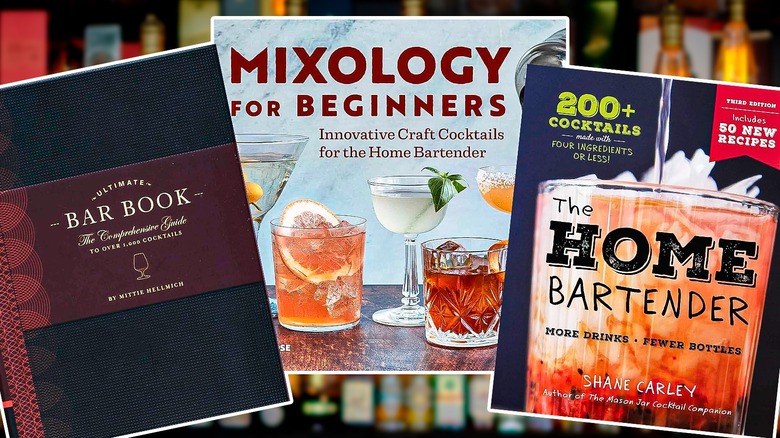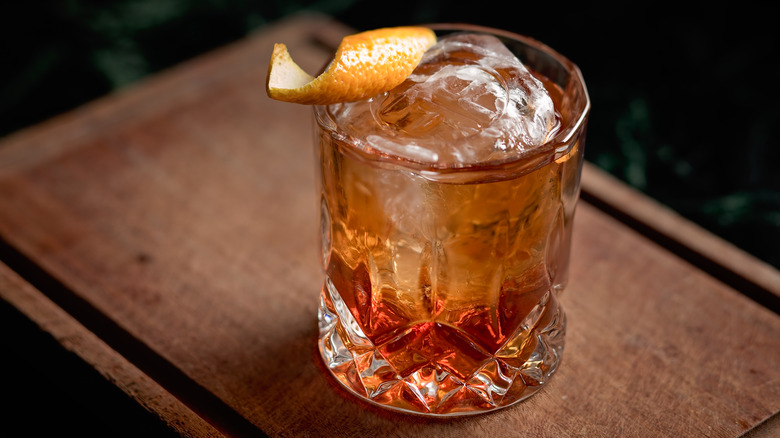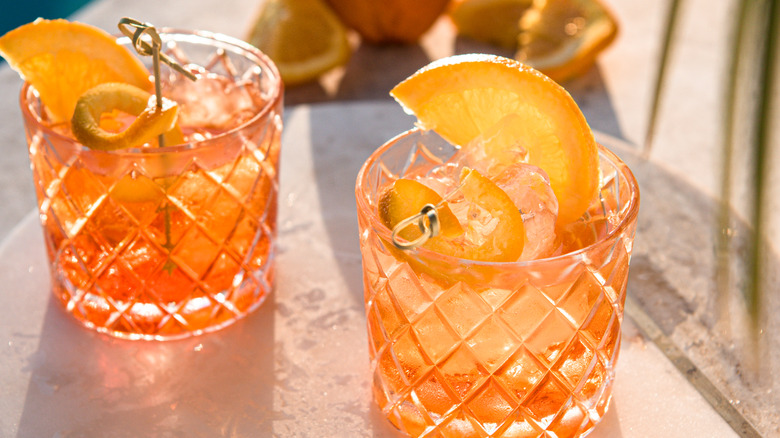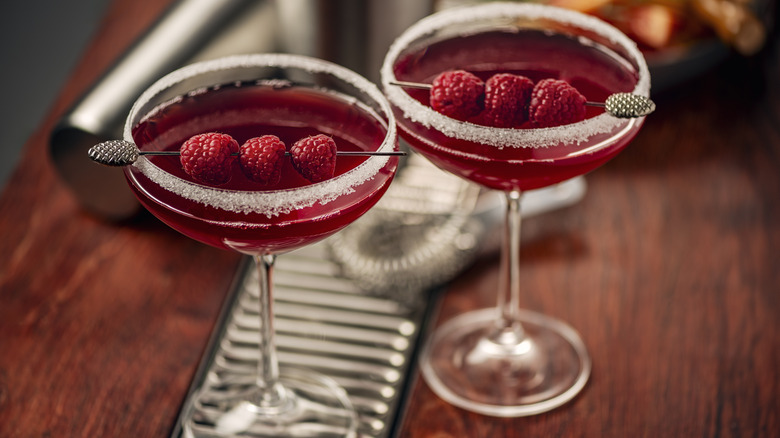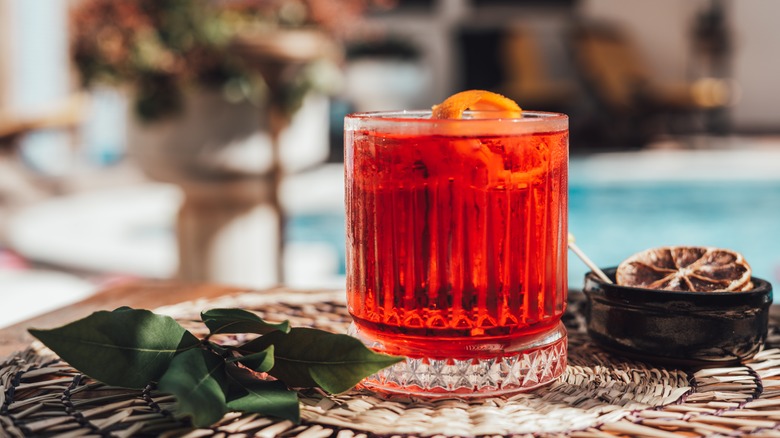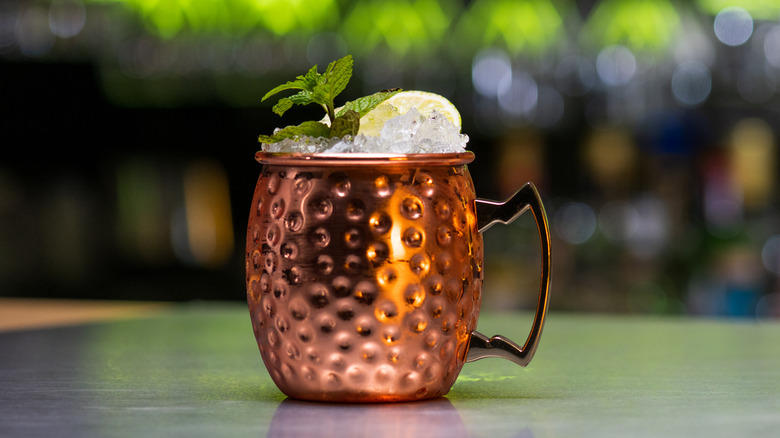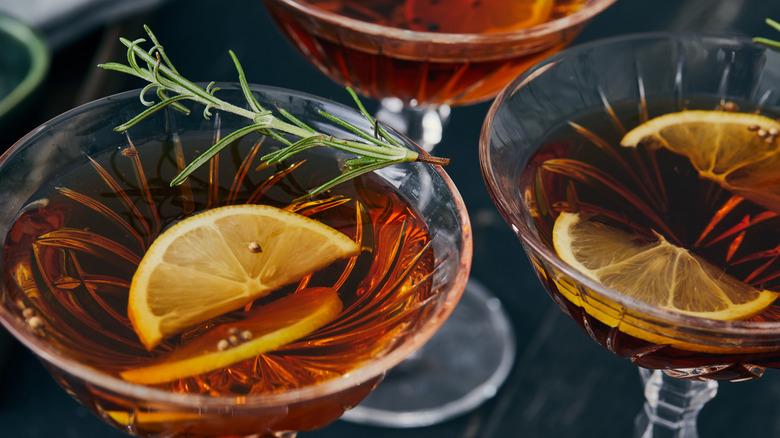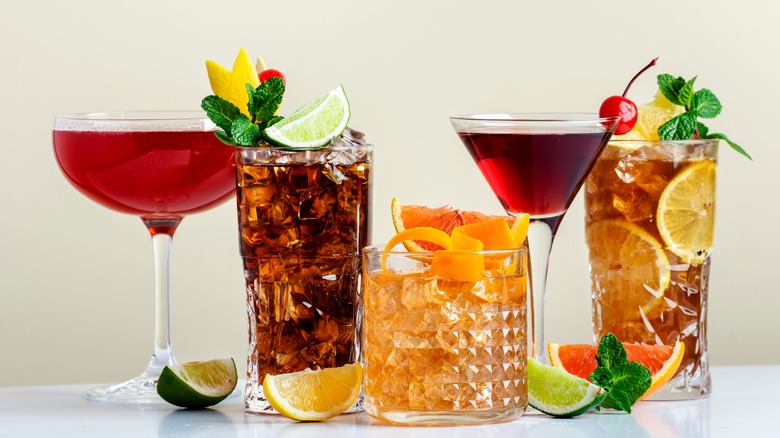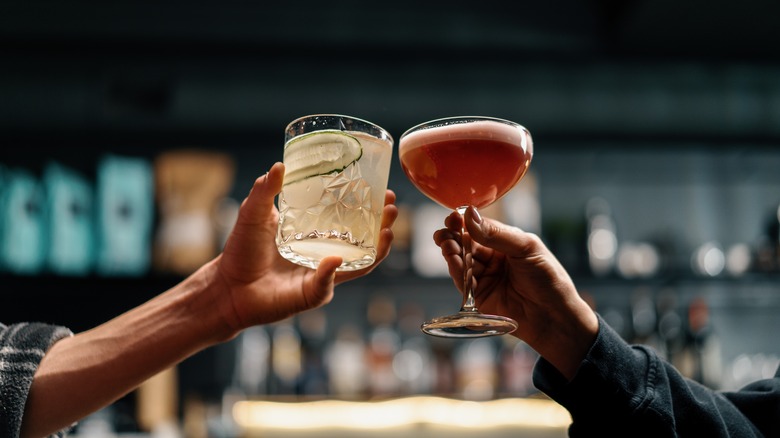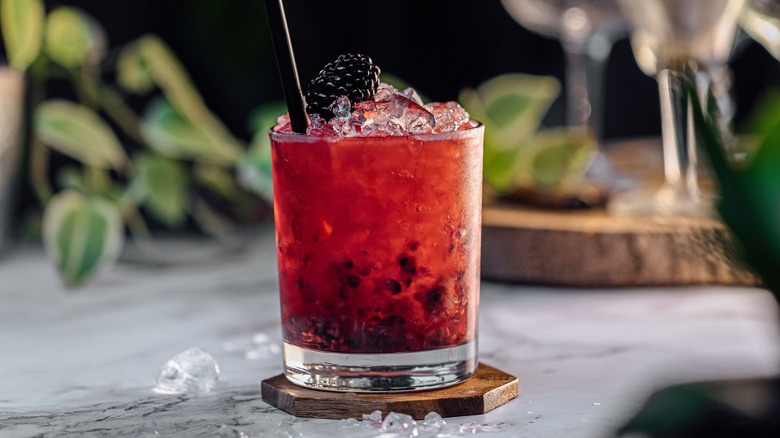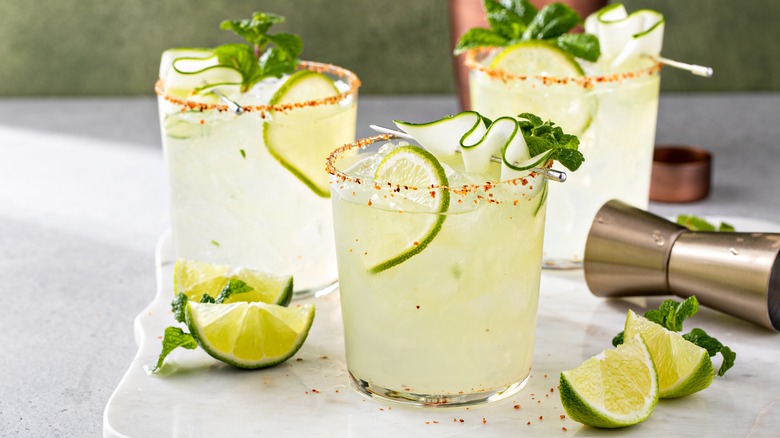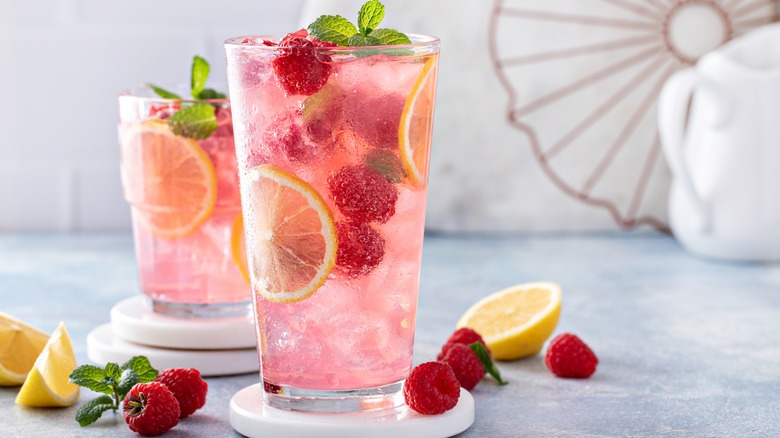12 Best Cocktail Books For Beginners
We may receive a commission on purchases made from links.
Whether you've just received your very first bar cart or are a little more familiar with cocktails, a cocktail recipe book is an essential guide for any would-be mixologist. Not only do they include a variety of recipes that are perfect for beginners, but some recipe books will include handy tips and tricks for the art of cocktail making, bringing you from a novice cocktail enjoyer to a pro-home mixologist.
The beginner cocktail recipe books featured in this list were chosen based on several factors. First, the recipe books featured include beginner cocktail recipes and often a beginner-friendly introduction to the world of cocktails. This means that books featuring primarily complex recipes were left off the list. Books were also judged based on their unique contributions, such as an especially user-friendly format, unique cocktails, specialized tricks or histories, or a completely beginner-focused design. Additionally, authors were examined for personal experience with cocktail mixing. Lastly, audience reviews were considered; qualifying books had not only high ratings from specifically beginner mixologists but also had a high quantity of reviews across various retailers.
The following books are loosely organized from the absolute most beginner-friendly to slightly more advanced cocktail books. Starting at the beginning will give you recipe books ideal for those who don't know where to start with making cocktails. Toward the end of the list are books that will help beginner mixologists impress any cocktail fan.
Cocktails Made Simple Recipe Cards
If you're brand-new to cocktail making and need something to reference while you're behind your home bar (or at the kitchen counter), you can't go wrong with a set of recipe cards. "Cocktails Made Simple Recipe Cards" includes a set of forty basic cocktails, so you'll never again be confused when a guest asks you for a classic sidecar cocktail. The cards include an illustration of what the final drink should look like, ingredients and measurements, the bar tools you'll need, information on glassware, and brief step-by-step instructions.
The cards are organized by spirit — so if you only have vodka, you won't be fumbling through stacks of bar cards to figure out which drinks you can actually make. "Cocktails Made Simple" does come in a few other formats for the strict book-lovers; if you're planning on using its book form behind the bar, we'd definitely recommend opting for the spiral-bound version, since it will lie flat. This will allow you to mix and read at the same time.
For the beginner who is looking to learn more complex recipes (or wants a higher quantity of recipes to have up their sleeve), "Cocktails Made Simple" is true to its name: You're not going to find hundreds of detailed cocktail recipes on these cards. "Cocktails Made Simple" also lacks any information on mixology or history of the cocktail. With that being said, they are incredibly handy to have on-bar while you're learning how to mix drinks.
The Art of Mixology
"The Art of Mixology" includes enough recipes to keep a new mixologist busy for a while. The book includes over one hundred different cocktail recipes, complete with tools and ingredients, steps, and a photograph of what each cocktail should look like. The cocktail index organizes each section by liquor, so you can easily find which drink you're looking for. "The Art of Mixology" also has a useful briefing on the various kinds of home bar cocktail tools, so you'll have definitions for all the equipment mentioned in the book.
The book also includes beginner-friendly info on common ingredients, from garnishes to types of ice. It even includes a section for mocktail recipes, which is great for anyone looking to take a break from mixing alcoholic drinks or host parties for guests who may or may not want to drink alcohol. Another bonus is that the book itself is elegantly designed, perfect for displaying on any coffee table or bar cart.
It's important to note for beginners who are just starting their collection of spirits that with more recipes comes more varieties of liquor. A beginner's bar cabinet likely won't have all the name-brand liquors listed within "The Art of Mixology," but the book doesn't exactly offer up any substitutions, either. Additionally, some reviewers noted that not all the proportions in the book were standard proportions, which might be difficult for a beginner learning how to use bar equipment.
Mixology for Beginners
"Mixology for Beginners" focuses on the basics but provides more information on cocktails than just their recipes. It's designed to help a beginner through the process of learning cocktail terminology, stocking a home bar, and understanding more about the drinks they're making. "Mixology for Beginners" even features handy ingredient guides — like a simple syrup recipe.
The book also includes information on bar tools and glassware (with illustrations) and their common uses. The most helpful section for the exploratory mixologist is the section on creating your own cocktail. This is useful not just for using up the liquors in your cabinet but also for understanding what goes into a cocktail's flavor profile.
"Mixology for Beginners" does include some photos, but not all of the drink recipes come with pictures of the final product. This can make finding (and creating) a recipe a bit trickier. Reviewers note that some of the recipes are a little too complex for the absolute beginner and that the book lacks a few common cocktail recipes.
The Little Black Book of Cocktails
"The Little Black Book of Cocktails" includes over 150 different cocktail recipes, perfect for any beginner mixologist looking to expand their cocktail knowledge. The best part about "The Little Black Book of Cocktails" is its thoughtful design. The book includes three separate cocktail indexes; this means you can sort through drinks by the name of the drink, the kind of spirit, or even its color. The book is also made to fit in your pocket, ideal for the on-the-go mixologist or pro bartender, and it's spiral-bound so that it will lie flat while you use it.
This book is also highly rated by beginner mixologists because it tends to keep things simple — this means you'll have more cocktail recipes to choose from while you're still learning the basics. It also means you won't need to stock your bar cart with dozens of spirits just to get through the book's recipes. "The Little Black Book of Cocktails" also includes a brief introduction designed to help beginners navigate the world of making and presenting a cocktail.
The biggest drawback of "The Little Black Book of Cocktails" is that it lacks any photographs of what each drink should look like. For beginners who want to know more about drink presentation or are judging which cocktail they want to make based on what it looks like, "The Little Black Book of Cocktails" doesn't give anything in terms of visuals. This is, however, mostly due to its small size.
The Joy of Mixology
"The Joy of Mixology" is often touted as an absolute must-have for anyone from bartenders to cocktail enthusiasts. The book is handy for beginners because it's designed to give a comprehensive knowledge of the cocktail, so that you'll be able to mix up your own recipes by the end. It begins with a history of the cocktail, details how to stock and run a bar, and ends with plenty of classic recipes (and then some) so you'll be able to learn to make the classics and impress guests with your cocktail knowledge.
Part of the reason why "The Joy of Mixology" is so well-recognized is because its author, Gary Regan, is hailed as a world-renowned cocktail expert. If there's anyone you can trust to give you the best advice on cocktails, it's Regan. If you're interested in learning not just the 'how' but also the 'why' of cocktail-making, "The Joy of Mixology" explains cocktails in a way that will help you learn the art behind cocktails.
"The Joy of Mixology" includes no pictures of what each cocktail looks like, which might prove restrictive for visual learners (or those trying to find a recipe for a drink they've only seen). If you're a beginner who is primarily interested in a plain cocktail recipe book, know that "The Joy of Mixology" is much more than that. You'd probably be better off investing in a strict book of recipes if you're not interested in doing some serious cocktail-related reading.
The Essential Cocktail Book
"The Essential Cocktail Book" is a classic book of cocktail recipes marketed towards both beginner and expert mixologists. "The Essential Cocktail Book" is a nice mix of recipes and how-tos; the book doesn't miss out on giving you information on glassware and tools or cocktail-making tips on top of its recipes. It doesn't stop at traditional recipes, either, as reviewers can attest to the fact that the book includes a good amount of traditional cocktails as well as modern classic cocktails.
The striking photography is another main feature of "The Essential Cocktail Book." The book's photographs are not only useful for understanding how to present each cocktail but also just to enjoy if you're looking for a book that can double as a bar cart or coffee table display. Additionally, each recipe featured in "The Essential Cocktail Book" has a brief description and history at the top, so you can learn more about the cocktails you're making.
It's worth noting that not every recipe in "The Essential Cocktail Book" will be accessible to beginners. This is due to the many required ingredients, primarily in modern cocktail recipes. If you're just venturing into mixology, you may find that some of these recipes use ingredients you wouldn't even think about having on hand. Fortunately, the book also features traditional recipes that won't be quite as complex for beginners to source.
The Home Bartender
"The Home Bartender" is a unique cocktail recipe book. The main draw of the book is that every single cocktail in it — and there are 150 of them — only requires four ingredients or less. The idea is that beginner mixologists shouldn't need to purchase hundreds (or thousands) of dollars worth of alcohol in order to enjoy making cocktails.
Thanks to the limited ingredients featured in each cocktail, it's relatively easy to learn multiple cocktail recipes at once. It also means every recipe is automatically straightforward to make. Another benefit of "The Home Bartender" is that it features virgin (or mocktail) versions of many of the drinks it details. This ensures you'll have the opportunity to enjoy practicing making the recipes in "The Home Bartender" without needing to use up your entire liquor cabinet.
Because "The Home Bartender" includes so many different recipes for drinks made with only four ingredients, it does have one drawback: Some of these cocktails use ingredients that are difficult to find. This can prove problematic for the beginner bartender with limited spirits on hand, even though the book intended to mitigate this problem. Additionally, "The Home Bartender" occasionally substitutes ingredients in cocktails with a traditionally high number of ingredients, which can change the quality of the original drink. Reviewers recommend skipping these recipes, but for the beginner who might not know how the original cocktail is supposed to be made, this can be difficult.
The Ultimate Bar Book
"The Ultimate Bar Book" includes basically everything you could want to know about each cocktail in the book. That's not an easy feat, given that there are over 1,000 cocktails featured in this extensive recipe book. For beginners who are desperate to know all there is to know about cocktail recipes (or are making drinks for very picky guests), you'll be hard-pressed to find other recipe books that boast the sheer quantity of cocktail recipes "The Ultimate Bar Book" offers.
Although the book is already big enough with recipes alone, the author also includes tips and tricks for beginner mixologists. It's basically a getting-started guide for beginners, mostly focused on bar stocking and bar tools. Additionally, the guide has a useful cocktail index — which is necessary with how many recipes there are to sort through.
According to most reviewers, one con of this book is that, due to the number of recipes featured, the print of the book is small. This makes it difficult to read while you're at the bar mixing up a drink — but you can't exactly be expected to memorize over 1,000 cocktail recipes, either. Also, the sheer volume of recipes featured in "The Ultimate Bar Book" can sometimes prove overwhelming, especially if you're a beginner mixologist.
Meehan's Bartender Manual
One major benefit of "Meehan's Bartender Manual" is that it's focused on a lot more than just cocktails. The book includes the best bar layouts for professional and home bars, information on how to stock a full bar, and a detailed history of cocktails. If you're serious about stocking your home bar and aren't sure where to get started, this book is an essential in-depth guide.
Not only is Meehan the founder of award-winning speakeasy PDT (Please Don't Tell) — one of the best speakeasies in NYC – he's even behind the drinks served all over the world in American Express Centurion airport lounges. This makes him a global cocktail expert — not just in making the drinks but in being a bartender, too. "Meehan's Bartender Manual" includes advice that ranges from how to make the best home bar ever to opening your very own professional bar. Surprisingly, it remains beginner-friendly while still including information that will interest those who are more dedicated to learning about cocktails and bars.
"Meehan's Bartender Manual" is just what the name implies — a manual, not strictly a recipe book. This means that beginners who don't need a lot of outside information on cocktail-making should look elsewhere. Note that "Meehan's Bartender Manual" includes a series of 100 cocktail recipes that will prove useful to beginner mixologists, but anyone looking for a simple recipe book will need to sift through a lot of bar-related information first.
Death & Co: Modern Classic Cocktails
"Death & Co" is a book for those looking to sprint the beginner-to-expert pipeline. Is this the very first cocktail book you should put on your shelf (or your bar cart)? Honestly, no. But if you want to learn about cocktails, you absolutely should not overlook "Death & Co."
Death & Co is one of the most respected, award-winning, and influential bars in the entire cocktail industry. Its book features over 500 cocktail recipes that were created by Death & Co bartenders themselves (who Death & Co promises are the "best in the industry"). But it's more than just a pretentious essay on the modern cocktail movement; the book is helpful for beginners, too. Through "Death & Co," you'll learn about buying alcohol, understanding drink theory, and bartending tips and tricks. It also has striking photographs of many of its original recipes.
As mentioned above, "Death & Co" is not about traditional cocktail recipes. For beginners who are still trying to learn the absolute basics, "Death & Co" won't suffice. Because the bar is so highly rated, its recipes are complex; this can also prevent all of the 500 recipes in the book from being beginner-accessible due to their ingredients. With that being said, "Death & Co" does include useful, beginner-friendly information about the art of cocktails; if you're looking to expand your cocktail knowledge, "Death & Co" will help you with that.
Tequila Mockingbird
"Tequila Mockingbird" is a perfectly unique cocktail book that's still lots of fun for a beginner who's just getting their first bar cart. You can probably already guess by its name, but "Tequila Mockingbird" is all about drinks playing on classic literature. Each drink recipe has a clever literature pun in its title.
"Tequila Mockingbird" isn't just about convincing you to read more of the classics, though. The book features information on mixology techniques and bar tools. It even has recipes for bar snacks and mocktails to pair with your newly-acquired cocktail knowledge.
For those looking for a recipe book with pictures, the illustrations in "Tequila Mockingbird" are all artistic (and are usually more focused on the related classic than the drink itself). This means the book doesn't provide a concrete idea of what the drink will look like. Additionally, though the puns are clever, they do mean the drink recipes aren't generally recognizable by name; classics like "The Hand-Mule's Tale" indicate which drink the recipe will feature, but not all of the titles will be easy for a novice mixologist to spot.
Bonus book: Mocktail Party
Okay, so why should a beginner cocktail artist invest in a mocktail book? After all, the entire point of cocktails is that they include alcohol. Well, if you're a beginner mixologist, there are actually a lot of benefits when adding a mocktail book to your collection. Mixology isn't just about following the steps in a cocktail recipe; it's about familiarizing yourself with your bar tools, creating the prettiest garnishes, and understanding which flavors go together.
The issue with learning mixology is that, like any hobby, practice makes perfect. But it's not always possible for a beginner to make and try several different cocktails in one day — and you might not feel comfortable recruiting guests to try your beginner drinks just yet. This is where mocktails come in — you'll get the chance to try your hand at making fancy garnishes, making a drink as fast as you can, or using tools you're unfamiliar with. Best of all, if you do mess up the drink, you won't be wasting any expensive liquor.
"Mocktail Party" focuses on non-alcoholic versions of traditional alcoholic drinks. But that doesn't mean the book is just a compendium of virgin recipes; the book focuses on mimicking the complex flavors of a regular cocktail. There's a wide range of flavors and styles of drink, so you can enjoy testing out different flavor combinations, learning your glassware, and making the most out of your home bar (cart) without using up all your alcohol.
